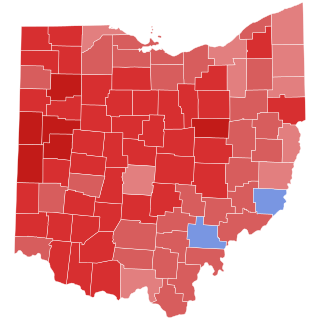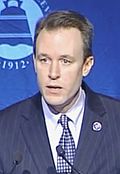Top Qs
Timeline
Chat
Perspective
2014 Ohio gubernatorial election
From Wikipedia, the free encyclopedia
Remove ads
The 2014 Ohio gubernatorial election took place on November 4, 2014. Incumbent Republican governor John Kasich won reelection to a second term in office by a landslide over Democratic candidate Ed FitzGerald and Green Party candidate Anita Rios. Primary elections were held on May 6, 2014.
Despite FitzGerald's massive defeat, he is, as of 2023, the last Democrat to carry the historically Democratic Monroe County, which voted for Republican candidate Mike DeWine four years later. Kasich's landslide victory gave him the highest percentage of the vote since George Voinovich's win in 1994, a large improvement from his narrow victory in 2010. As of 2024[update], this was the last time the counties of Cuyahoga and Franklin voted for the Republican candidate and the last time Monroe County voted for the Democratic candidate.
This was one of the nine Republican-held governorships up for election in a state that Barack Obama won in the 2012 presidential election.
Remove ads
Background
Kasich, who was elected with Tea Party support in 2010, faced considerable backlash from the movement. His decision to accept the Patient Protection and Affordable Care Act's expansion of Medicaid, his increased spending, taxation of fracking on Ohio farmland and perceived failure to go far enough on charter schools and school vouchers caused Tea Party groups to refuse to support his campaign.[1] When Kasich passed over Tea Party leader Tom Zawistowski for the position of executive director of the Ohio Republican Party in favor of Matt Borges, who worked with a gay rights group, that was widely seen as the last straw.[2] Tea Party groups announced they would support a primary challenger, or, if none emerged, the Libertarian nominee. Zawistowski said, "John Kasich is going to lose in 2014. We don't care who else wins."[3] Ultimately, Kasich was unopposed in the Republican primary.
Remove ads
Republican primary
Candidates
Declared
- John Kasich, incumbent governor[4]
- Running mate: Mary Taylor, incumbent lieutenant governor
Withdrawn
Results
Remove ads
Democratic primary
Candidates
Declared
- Larry Ealy, former tow truck operator, former male stripper, perennial candidate and vexatious litigant[9][10][11]
- Running mate: Ken Gray, nurse[12]
- Ed FitzGerald, County Executive of Cuyahoga County and former mayor of Lakewood[13]
- Running mate: Sharen Neuhardt, attorney, nominee for Ohio's 7th congressional district in 2008 and for Ohio's 10th congressional district in 2012[14]
Withdrew
- Todd Portune, Hamilton County Commissioner[15][16]
Declined
- Michael B. Coleman, mayor of Columbus[17]
- Richard Cordray, director of the Consumer Financial Protection Bureau and former Ohio Attorney General[18]
- Tim Ryan, U.S. representative[19]
- Ted Strickland, former governor[17]
- Betty Sutton, former U.S. representative[20]
Results

FitzGerald
- 60–70%
- 70–80%
- 80–90%
Green primary
Candidates
Declared
- Anita Rios, nominee for lieutenant governor of Ohio in 2006 and 2010 and candidate for the U.S. Senate in 2012[21]
- Running mate: Bob Fitrakis, author and perennial candidate[21]
Disqualified
Results
Remove ads
Libertarian primary
Charlie Earl gathered enough raw signatures to obtain ballot access.[22] However, he was removed from the ballot because technical faults in collection rendered many of his signatures invalid. The decision was appealed in federal court.[25]
Candidates
Disqualified
- Charlie Earl, former Republican state representative[26]
- Running mate: Sherry Clark, newspaper publisher[27]
General election
Summarize
Perspective
Campaign
FitzGerald released a plan for state-funded universal preschool in addition to announcing his support for gay marriage.[28] He criticized Kasich for signing into law income tax cuts that save larger sums of money for wealthier Ohioans than poorer ones, while increasing sales taxes, which tax a larger percentage of income from poorer Ohioans than from wealthier ones.[29] FitzGerald also chided Kasich for a lack of transparency at JobsOhio, the privatized economic development agency that Kasich formed,[30][31][32] and for signing into law bills that cut early voting days and limit the distribution of absentee ballot applications.[33][34] FitzGerald faced several scandals that damaged his candidacy, most notably the revelations that he had driven for several years without a valid driver's license, him being found in a car late at night with a woman who was not his wife, and that his initial running mate, State Sen. Eric Kearney, owed over $1 million in unpaid taxes. Additionally, FitzGerald consistently trailed Kasich in fundraising throughout the entire campaign.[35]
Endorsements
John Kasich
Newspapers
Organizations
Ed Fitzgerald
Individuals
- Sherrod Brown, United States senator (D-OH)[44]
- Michael B. Coleman, mayor of Columbus[45]
- Frank G. Jackson, mayor of Cleveland[46]
- Marcy Kaptur, U.S. representative (D-OH-9)[47]
- Ted Strickland, former governor of Ohio[48]
Organizations
Predictions
Polling
Hypothetical polling
- ^ Polling for the Ohio Democratic Party
Results

Counties that flipped from Democratic to Republican
- Ashtabula (largest city: Ashtabula)
- Belmont (largest city: Martins Ferry)
- Cuyahoga (largest city: Cleveland)
- Erie (largest city: Sandusky)
- Franklin (largest city: Columbus)
- Harrison (largest city: Cadiz)
- Hocking (largest city: Logan)
- Jackson (largest city: Jackson)
- Jefferson (largest city: Steubenville)
- Lawrence (largest city: Ironton)
- Lorain (largest municipality: Lorain)
- Lucas (largest city: Toledo)
- Mahoning (largest municipality: Youngstown)
- Meigs (largest city: Middleport)
- Montgomery (largest city: Dayton)
- Noble (largest city: Caldwell)
- Ottawa (largest city: Port Clinton)
- Perry (largest city: New Lexington)
- Pike (largest city: Waverly)
- Ross (largest city: Chillicothe)
- Scioto (largest city: Portsmouth)
- Summit (largest city: Akron)
- Trumbull (largest city: Warren)
- Vinton (largest city: McArthur)
- Washington (largest city: Marietta)
- Wood (largest city: Bowling Green)
By congressional district
Kasich won 14 of 16 congressional districts, including two that voted for Democrats.[89]
Remove ads
References
External links
Wikiwand - on
Seamless Wikipedia browsing. On steroids.
Remove ads





